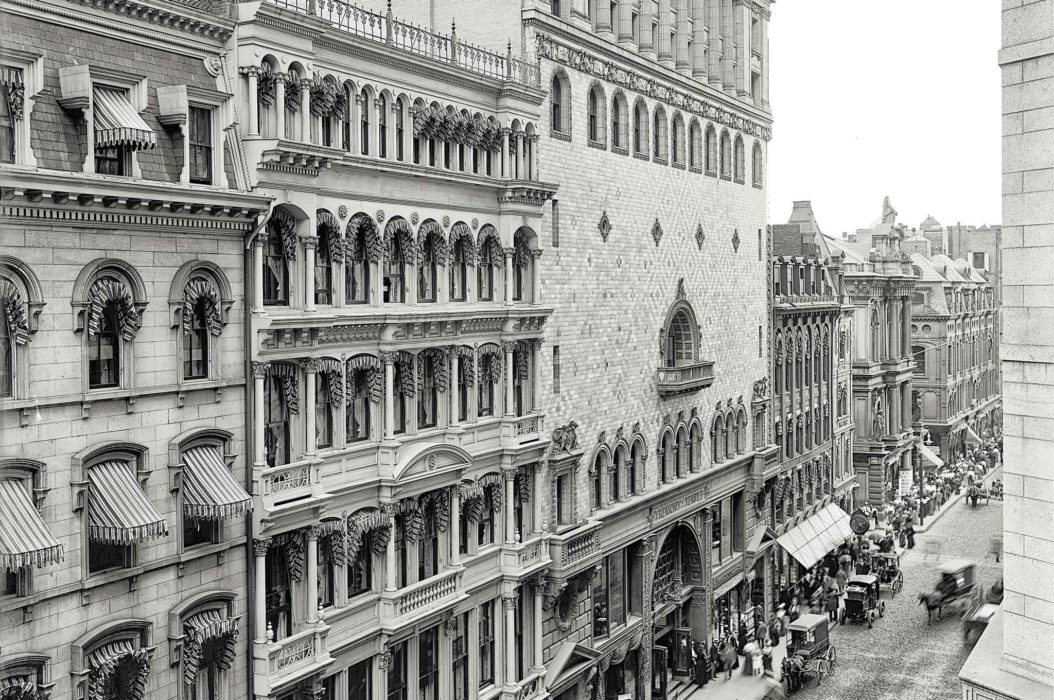‘ABDU’L-BAHÁ LOOKED OUT upon an audience of 1,000 Unitarian ministers and 2,000 guests on the evening of May 22, 1912, in the largest church in the New England region. Religion, he told them, was fundamentally dead. “The essential realities, which the Prophets labored so hard to establish in human hearts and minds, while undergoing ordeals and suffering tortures of persecution, have now well nigh vanished.”
It was the eighty-seventh anniversary celebration of the American Unitarian Association, a week-long event held at Tremont Temple in Boston.
The Unitarians had heard it before. Seventy-five years earlier one of their own, Ralph Waldo Emerson, delivered an address at Harvard Divinity School and told the graduates that their true calling was to breathe new life into the cold and rotting religious forms of their age.
Yet Emerson’s talk on that day also removed the traditional church from the equation. The only way to restore things, he said, was to empower individual souls to “go it alone.” It was a truly American take on religion that placed personal freedom above everything else. But it was only 1838, and most Unitarians called for Emerson’s head.

By 1860 the Unitarians were disillusioned: they had become just another conservative Christian denomination.
Then a rebellion broke out at the conference of the American Unitarian Association in 1866. Reverend William James Potter cried out for a “spiritual anti-slavery society.” He wanted a movement that would capture what he thought had been the essence of the Protestant tradition – a radical resistance to authority. It would take the freedom that Emerson had called for to its logical conclusion: a complete openness to any and all beliefs.
The next year, on May 30, 1867, the “Free Religious Association” was born, during the annual Unitarian Anniversary Week. They designed it to be inclusive. Among those in attendance were Lucretia Mott, a Quaker abolitionist and women’s rights activist, who had started the Seneca Falls Women’s Rights Convention in 1848 with Elizabeth Cady Stanton; Rabbi Isaac Wise, a Reform Jew; and, of course, Ralph Waldo Emerson..
But their openness soon proved to be their greatest problem. It was one thing to challenge religious orthodoxy, but quite another to build a model of “free religion” from the ground up. In other words, it was simple to list all the things it shouldn’t be, but not so easy to decide exactly what it was. Potter insisted that the organization could not and should not take any positions — theological, social, or political.
By this point he was even refusing to be called a Christian in spite of leading a Unitarian congregation. He objected to any supernatural claims for religion, and understood God as simply an impersonal force hidden in the universe. He grew highly suspicious of Christians, or adherents of any other organized religion.
Potter managed to hold the organization together in spite of the radical individualism of most of its members, until he died in 1893. The Free Religious Association eventually fizzled out. It became a ragtag collection of eclectic individuals, many of them agnostics, some even atheists.
Then, on May 24, 1912, ‘Abdu’l-Bahá stood in front of what was left of them.

‘Abdu’l-Bahá didn’t speak in general terms about reform, renewal, and progress, as he had to the Unitarians two days earlier. To the Forty-Fifth Annual Meeting of the Free Religious Association he was very specific. He spoke in favor of the one thing the Reverend William James Potter had rejected: the authority of the prophets of God.
“The prophets of God,” ‘Abdu’l-Bahá argued, “have all promulgated the same foundation; they have given fundamentally the same teachings, and the teachings of the prophets of God are pure spirit, are pure religion, are pure love, are pure unity.” He mentioned, among them, Moses, Jesus, Zoroaster, Buddha, Muhammad, and Bahá’u’lláh. It was one thing to challenge the religious authority held by church officials, but something quite beyond the pale to dethrone the prophets of God.
“Is it meet for us,” he asked the embattled Free Religionists, “to leave aside the wisdom of God and to create certain imaginary distinctions and to hold tenaciously thereto and to cause enmity among humanity? God forbid.”






